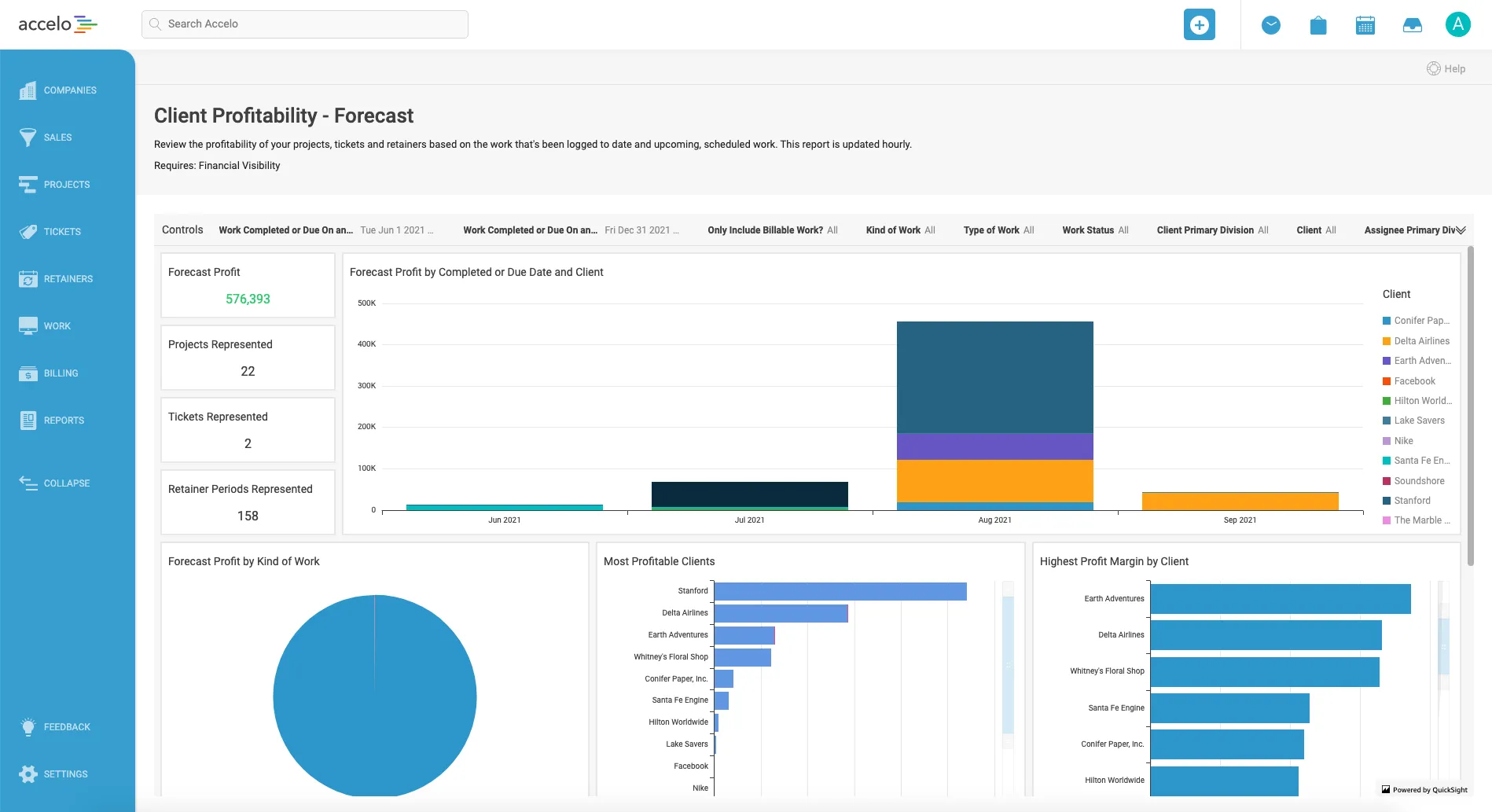Accelo Acquires Forecast, Adding Depth to AI and Capacity Planning Capabilities
Read the Press Release



Customer relationship management (CRM) is a set of practices and technologies for managing your company’s customer relationships and interactions. When most people talk about CRM, they are usually referring to a CRM system, a tool that helps with contact management, sales management, agent productivity and more.
CRM software can help you automate key administrative tasks like data entry, note-taking, recording contact information, lead routing and creating email templates. It aggregates and stores customer data from a variety of channels, including but not limited to your company's website, emails, phone calls, live chat messages and social media.
Let's review what you need to know about a CRM database and how to choose the right one for your business.
While a CRM system often includes a database to store customer data, it differs from a simple database in that it includes many powerful features beyond data storage. CRM software can include:
<10-profitability-essentials>
Another way to look at it is like this: A database stores and organizes past data, while CRM software stores data and uses it to help you effectively plan and strategize for the future. A CRM database is specifically built to help you automate critical tasks and extract insights to power your business.
Popular CRM systems include:
You might also be wondering whether or not Google includes a CRM platform in its popular Workspace offering. They, unfortunately, do not — but most popular CRM tools provide convenient integrations with Google Workspace apps.
A CRM database is a tool that helps you gather your customer information in a single, centralized location. You can manage contacts, automate data entry and develop reports with the available data.
Customer data stored in a CRM database can include items like:
Most CRM databases are based in the cloud, so your employees can access the data anytime, anywhere. Whether you're taking customer calls, creating reports or building out an email campaign, you'll be able to take effective, data-informed action.
By enabling key tasks like contact management, tracking customer interactions and email marketing, a CRM database can help you answer critical questions about both your customer base and your sales and marketing initiatives. Let's dive into some of the most important ways a CRM database can benefit your business.
Nix the tedious administrative tasks so your employees can spend more time focusing on what's important. CRM software automates tasks like data entry, note-taking, storing prospective clients' contact information, sending follow-up emails and more.
Many CRM platforms also integrate with other popular business apps like Google Workspace, Mailchimp, Salesforce and QuickBooks. Integrations allow you to build hands-off workflows you can use to set up automated appointment scheduling, email campaigns, billing and payments, customer satisfaction surveys and document signing with your favorite tools and platforms.
CRM databases make it easy for you to both automatically and manually add customers' contact details. With CRM software, you also gain the ability to sort and filter your customers by various attributes like:

The level of organization a CRM provides can arm your company with the ability to reach out to and follow up with prospects quickly and with the most accurate, up-to-date information on hand.
A CRM will help your organization personalize customer interactions and target prospects with relevant information. Here are two examples of how this might work.
Accessing a particular client's information can also help you personalize face-to-face consultations to address their unique needs and pain points.

Many CRM systems provide reporting capabilities that can help you not only track leads and deals but create revenue forecasts to see if your deals are meeting your quarterly or yearly goals. Revenue forecasting can help you make data-driven decisions and inform your business strategy. A CRM database can help you save sales data and generate reports that showcase metrics in an easy, readable format. These metrics might include items like average monthly recurring revenue, sales velocity and average deal size.
This way, you can set and modify goals like next quarter's sales quota or revenue with objective data to back them up. CRM reports can also help you figure out which of your sales and lead generation tactics are working — and which ones you can nix to focus on winning strategies.
CRM databases usually offer a complete view of your sales pipelines, which makes it easier for you to manage and track deals. Your sales organization can track deals to see how close they are to their monthly or quarterly quota.
READ NEXT: Is CRM Software Worth the Investment for Small Businesses?
To recap, a CRM database may not be as functional as a CRM system. A robust CRM system can help you manage your contacts, automate administrative tasks and make data-driven business decisions so you can serve your customers more effectively.
Learn more about how your business could benefit from a client work management platform — one that does much more than a basic CRM system. Start your trial of Accelo or schedule a demo.

